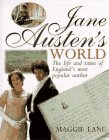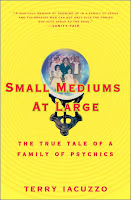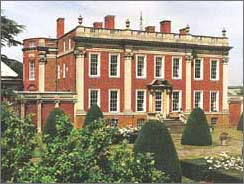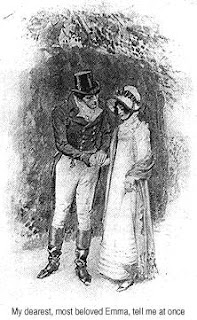 You have won a copy of JANE AUSTEN’S WORLD by Maggie Lane, courtesy of Amanda. Please email riskies@yahoo.com to claim your prize.
You have won a copy of JANE AUSTEN’S WORLD by Maggie Lane, courtesy of Amanda. Please email riskies@yahoo.com to claim your prize.
Thanks to all who helped us celebrate the divine Jane’s birthday!
 You have won a copy of JANE AUSTEN’S WORLD by Maggie Lane, courtesy of Amanda. Please email riskies@yahoo.com to claim your prize.
You have won a copy of JANE AUSTEN’S WORLD by Maggie Lane, courtesy of Amanda. Please email riskies@yahoo.com to claim your prize.
Thanks to all who helped us celebrate the divine Jane’s birthday!
First of all, let me tell you why Megan has been absent from the blog for two weeks. Sadly, her father passed away, very unexpectedly.
Our Riskies community knew Megan’s father through her eyes and most movingly from the Mother’s Day tribute she gave to him here . Wasn’t this blog post voted a Megan favorite? For good reason.
Megan assures us she is doing well, but our hearts go out to her and her family. Her dad was only 65, so it feels like he’s been snatched from her way too soon.
Megan’s personal blog has been keeping us informed. For those who wish to offer condolences, why don’t you leave a message for Megan there? I do encourage you to scroll down on Megan’s blog and read about the amazing man who was her father (or click here).

Very special thanks to Myretta Robens, Regency author and friend to Megan, who graciously jumped in to blog about Pride & Prejudice last Friday. We’re still getting comments!
Megan will return to the Riskies when she is able, maybe even by Friday. In the meantime, hugs to her from all of us.
This week we’re talking about our favorite reads of the year.
Sigh.
Compared to the other Riskies and, I’m sure, our entire Riskies community, I am definitely the least well read. I just don’t read many books at all and I rarely keep track and I have a horrible memory. So this is a hard blog.
I can say that of the fiction I’ve read two of my very favorites are Amanda’s A Notorious Woman and Janet’s Rules of Gentility. A Notorious Woman had the rich atmosphere of Venice and was an exotic and different read for me. Rules of Gentility was sooooo clever, sparkling and bright. I’m proud as I can be that my fellow Riskies wrote such wonderful books.
 I’ve been mostly reading nonfiction this year, reading for research and inspiration. My favorite book about the Regency (well, BEFORE the Regency) was Paula Byrne’s biography of Perdita. I knew virtually nothing about Mary Robinson and I found her life very remarkable. Lovely to know that there were strong, complex, talented, surviving women in that time period!
I’ve been mostly reading nonfiction this year, reading for research and inspiration. My favorite book about the Regency (well, BEFORE the Regency) was Paula Byrne’s biography of Perdita. I knew virtually nothing about Mary Robinson and I found her life very remarkable. Lovely to know that there were strong, complex, talented, surviving women in that time period!
I’ve also been reading some other sorts of books for research, books about psychic ability. I’ve read Allison Dubois’s books, We Are Their Heaven and Don’t Kiss Them Goodbye. The TV series Medium is based on Allison Dubois’s life. Verrry interesting.

Because Amanda saw it on a library shelf, I also read Terry Iacuzzo’s Small Mediums At Large: The True Tale of a Family of Psychics. Really fascinating!
I’ve read a couple more books in the same vein. Why? you ask. Well, I have this idea for books which include what I consider “real” psychic phenomena-clairvoyance, psychic healing, mediums, telepathy. Real, as opposed to things like vampires, werewolves, and shape-shifters.
Hee hee. I’ll bet my reading list is unique!
What have you been reading this year? Have you read any of these books? What did you think of Rules of Gentility and A Notorious Woman?
What books are you buying for gifts? I’m thinking of buying The Dangerous Book for Boys for my son…who is an adult.
“I hope you received my little parcel by J. Bond on Wednesday evening, my dear Cassandra, and that you will be ready to hear from me again on Sunday, for I feel that I must write to you today. […] I want to tell you that I have got my own darling child from London.” – Jane Austen to her sister, Cassandra, Friday, January 29, 1813
My book is Pride and Prejudice, and it is a bit daunting to talk about Jane Austen’s “darling child,” and perhaps the darling child of most of her readers. For what percentage would readily admit that Pride and Prejudice is their favorite of the six novels? And in what context has the opening line, “”It is a truth universally acknowledged, that a single man in possession of a good fortune must be in want of a wife,” not been paraphrased. If any book is part of the English-speaking world’s collective unconscious, Pride and Prejudice is it.
Shall I summarize it for you? Is it possible you don’t know about Elizabeth and Darcy’s prickly early encounters and gradual journey into love? Do you not know that Lydia eloped with George Wickham and that Darcy made him marry her? Haven’t you heard that despite Darcy’s early efforts, his friend Bingley returned to Hertfordshire to marry Jane? If you haven’t read the book, surely you have seen one of the many adaptations.
Pride and Prejudice is the iconic love story wrapped in a delicious comedy of manners. No one handles the English language like Jane Austen, and no one wields a sharper pen.
“My reasons for marrying are, first, that I think it a right thing for every clergyman in easy circumstances (like myself) to set the example of matrimony in his parish. Secondly, that I am convinced it will add very greatly to my happiness; and thirdly — which perhaps I ought to have mentioned earlier, that it is the particular advice and recommendation of the very noble lady whom I have the honour of calling patroness. Twice has she condescended to give me her opinion (unasked too!) on this subject; and it was but the very Saturday night before I left Hunsford — between our pools at quadrille, while Mrs. Jenkinson was arranging Miss de Bourgh’s foot-stool, that she said, ‘Mr. Collins, you must marry. “
In my opinion, no funnier proposal has ever been written.
Contrary to Jane Austen’s satiric “Plan of a Novel,” wherein the angelic heroine and her long-winded father are harried from one European country to another by the anti-hero and a series of importunate lovers, the plan of Pride and Prejudice is practically a perfect paradigm for the modern romance:
1) Haughty, upper-class Hero enters the realm of the less exalted Heroine.
2) Hero and Heroine take an immediate dislike to one another.
3) Friends of Hero successfully detach him from the Heroine, but not before he has had second thoughts about her attractiveness.
4) Hero detaches friend from Heroine’s sister.
5) Hero girds his loins and proposes to Heroine, who still thinks he is an interfering snob and shoots him down.
6) Hero absorbs reproof and goes about reforming himself to be worthy of the woman he once thought it “a punishment” to dance with.
7) Heroine and Hero meet again, heroine has change of heart, but before she can make her feelings known,
8) Heroine’s foolish sister elopes with a scoundrel, later to be rescued (sort of) by Hero. Hero also restores detached suitor to Heroine’s sister.
9) The two meet again, Hero proposes, and they live happily ever after.
 A good writer, can take that outline and deliver a delightful, modern Regency Romance. Some have and, I daresay, more will.
A good writer, can take that outline and deliver a delightful, modern Regency Romance. Some have and, I daresay, more will.
Although I would never classify Jane Austen as a romance writer, there is little doubt that she can write romance. And there is little doubt she has inspired several generations of romance writers. Jane Austen, and particularly Pride and Prejudice, is the reason I began to write Regency Romance. And the reason I continue to do so.
So, is this your favorite Jane Austen novel? Is it because of the romance? The humor? The sheer perfection of it? Is it, as Jane Austen said, tongue in cheek, too “light, bright and sparkling?” Is it the reason you read (or write) in the Regency?

You heard it here. Mansfield Park is the Austen equivalent of big girl panties.

I chose Mansfield Park because I was afraid no one else would want it, and I was interested in seeing what I thought of the book decades after my last attempt at reading it. Briefly, it is the story of Fanny Price, who is raised by her wealthy relatives the Bertrams in their luxurious home Mansfield Park (thought to be based on Cottesbrooke Hall), where [i]f tenderness could ever be supposed wanting, good sense and good breeding supplied its place.
I read the Oxford University Press edition–not my first choice but the local library didn’t have a copy and I couldn’t find my collected Austen. No helpful notes or introduction, and so I was left to my own interpretation. First, I had trouble figuring out what is the book really about–it’s unlike Austen’s other works in that it covers so much ground and so many themes, and the point of view shifts frequently; I believe it’s the only one of the novels that uses multiple points of view. It’s the only one of the novels that is concerned in a major way with fashionable mores of the ton and has more titled characters, at least mentioned in passing, than you can shake a stick at.
Is it a comedy? Sort of. Mrs. Norris, the only truly funny character, isn’t that funny after a time as you realize how mean-spirited she is and as you see her fall out of favor with the powerful Sir Thomas Bertram. There’s also the stagestruck Mr. Yates who really really likes his blue dress (no, not that sort of dress) and pink satin cloak.
Is it a love story? Sort of. Edmund and Fanny slide into marriage–and the one thing I do remember from earlier readings is that these two are well matched in vapidity and longwindedness. The moral of the book?–that if you wait, all things will come to you?–Fanny must have a horse, a fire in her room, and ultimately a husband (the cousin marrying thing was not nearly as icky as you might think). That virtue is rewarded, certainly; Miss Prism (The Importance of Being Earnest), whose definition of fiction was that the good end happily and the bad unhappily, probably enjoyed Mansfield Park.
Fanny develops from the poor, sickly relative into an attractive and well read young woman, although shy and given to longwinded rhapsodies on the beauties of nature etc. (this is a book of voluble characters. Edmund, bless him, goes on for pages and pages). She and her Bertram cousins are befriended by the worldly and ambitious brother and sister Henry and Mary Crawford, and Henry becomes involved with both of Fanny’s female cousins, playing them off against each other, even though one of them is engaged. And Fanny finds herself befriending Mary, even though she isn’t really sure she likes her or approves of her, and feels pretty much the same way about Henry.
One of the early crises of the book–ending with a splendid cliffhanger at the end of Volume I–is the amateur staging of a very naughty play, Lovers’ Vows. Fanny refuses to take part; poor Edmund, in a crisis of conscience, decides it is his moral duty to take a part in the play. (I think, but I’m not sure, that you are meant to laugh here.) Much later you find out that Edmund very much enjoyed rehearsing with the fascinating Miss Crawford, with whom he’s fallen in love, even though he suspects her moral code does not match up to his. And, yes, she really does say “What gentleman among you am I to have the pleasure of making love to?”
And then Henry Crawford tells his sister that his next challenge is to make Fanny fall in love with him.
Yikes.
Is Austen writing her version of Les Liaisons Dangereuses? Certainly Crawford, short, dark, flirty, and keen on farming as well as women, is no Valmont. Henry arranges for a promotion for Fanny’s midshipman brother and even wrenches good behavior out of her uncouth family in Portsmouth. But Fanny holds firm–she won’t marry a man she doesn’t love, however persuasive he, his sister, and her own relatives are in gently blackmailing her to accept him, even if Henry does seem to be genuinely in love with her. Her instincts prove to be right.
Mansfield Park is possibly Austen’s sexiest book, and I think this may be one reason–other than the yawn-inducing Fanny and Edmund–why it’s her least favorite. I suspect it may be beyond many readers’ comfort zones–it doesn’t sound like dear Jane. There’s a tremendously strong physical awareness between her characters:
… she gradually slackened in the needle-work, which, at the beginning, seemed to occupy her totally; how it fell from her hand while she sat motionless over it—and at last, how the eyes which had appeared so studiously to avoid him throughout the day, were turned and fixed on Crawford, fixed on him for minutes, fixed on him in short till the attraction drew Crawford’s upon her, and the book was closed, and the charm was broken.
And the most blatant expression of physical desire of all of Austen’s books:
…Maria, still feeling her hand pressed to Henry Crawford’s heart, and caring little for anything else.
The characters are equally conscious of their physical presence indoors and outside. The book is full of references to space, horizons, the landscape improvements of Repton and others that open up vistas; and their movements around the house are like stage entrances and exits. There’s an extraordinary scene, elaborately choreographed, involving a locked gate, when the Bertrams, Fanny, and the Crawfords visit the estate of Miss Bertram’s fiance. When Fanny visits her family in Portsmouth you almost expect her to whip out a tape measure, so shocked is she by the humble dimensions of the rooms.
Enough from me. Have you read Mansfield Park? If not, why not? If you have, what do you think of it?
 This is how Jane Austen herself described Emma, her most flawed heroine. I’m going to focus on this issue because I think it’s the crux of why there are such widely differing opinions on this book.
This is how Jane Austen herself described Emma, her most flawed heroine. I’m going to focus on this issue because I think it’s the crux of why there are such widely differing opinions on this book.
First I’ll say this isn’t my favorite Austen either. (PRIDE & PREJUDICE and PERSUASION are each my favorite, depending on which one I’ve read most recently.) When I first read EMMA as a teenager, I didn’t like it much. Being insecure myself, I didn’t want to identify with a heroine who made so very many embarrassing mistakes. At the time I would almost (hanging head in shame) rather identify with a Barbara Cartland heroine, though come to think of it they all had that embarrassing inability to complete a sentence in the hero’s presence!
Anyway, once I had outgrown the desire for perfect heroines, Emma grew on me. I’ve become more comfortable with my own flaws so now I also prefer heroines who make mistakes as long as they have the saving grace of learning from them as Emma does.
I even think I’ve come to a better understanding of Emma’s behavior toward Harriet Smith and her unkindness to Harriet’s suitor, the farmer Robert Martin. Emma’s most obvious motivation for “improving” Harriet appears to be an officious desire to manage everything. But reading between the lines, I wonder if part of the cause was loneliness. Emma’s sister married and moved away, then Miss Taylor did the same. She was encouraged to befriend Jane Fairfax but really, Jane Fairfax was not the stuff of which BFFs are made. Even Mr. Knightley admits that she ‘has not the open temper which a man would wish for in a wife.’ That open temper was a quality I think Emma longed for in a friend.
 So Emma tried to mold Harriet into something more like herself, with disastrous results. I can sympathise with this because I once made a similar mistake. All I can say is that both Emma and I meant well and we are brave enough to admit when we are wrong. That ought to count for something!
So Emma tried to mold Harriet into something more like herself, with disastrous results. I can sympathise with this because I once made a similar mistake. All I can say is that both Emma and I meant well and we are brave enough to admit when we are wrong. That ought to count for something!
I don’t find EMMA quite as romantic as P&P or PERSUASION, yet there’s a part of the romance that works powerfully for me. I like that Mr. Knightley loves Emma enough to always want to bring out the best in her and that he appreciates her courage in admitting her mistakes. The line from the book, so beautifully delivered by Jeremy Northam in the 1996 film: “I have blamed you, and lectured you, and you have borne it as no other woman in England would have borne it” is one of my favorites. I love the idea of someone being totally honest with you and loving you despite–or even because of–your faults.
So anyway, EMMA has grown on me to the point that it’s a strong #3 in my Jane Austen favorites list. But I still understand why it is last on many people’s lists. I have seen reviews of Joan Aiken’s spinoff JANE FAIRFAX (which I haven’t read myself) written by readers who say they detested Emma in the original. Jane Fairfax is a much more obvious choice of heroine by modern romance terms: virtuous, impoverished, an obvious object for sympathy. But being a bit of a contrarian here…why shouldn’t a heroine who is “handsome, clever, and rich, with a comfortable home and happy disposition” have a romance too?
to the point that it’s a strong #3 in my Jane Austen favorites list. But I still understand why it is last on many people’s lists. I have seen reviews of Joan Aiken’s spinoff JANE FAIRFAX (which I haven’t read myself) written by readers who say they detested Emma in the original. Jane Fairfax is a much more obvious choice of heroine by modern romance terms: virtuous, impoverished, an obvious object for sympathy. But being a bit of a contrarian here…why shouldn’t a heroine who is “handsome, clever, and rich, with a comfortable home and happy disposition” have a romance too?
Let me know what you think about EMMA, either the main character or any others you’d like to discuss. And don’t forget, we’ll be giving away a copy of JANE AUSTEN’S WORLD to a lucky winner chosen from comments all this week!
Elena
www.elenagreene.com
